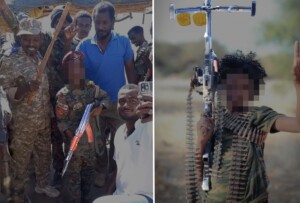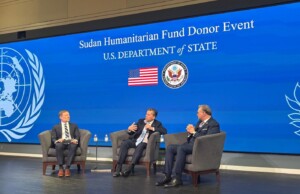New director appointed for Sudanese Radio and TV Corporation
Ismail Eisawi was removed from his post as Director of the Sudanese Radio and Television Corporation by Prime Minister Abdallah Hamdouk yesterday following criticism by the Democratic Alliance of Lawyers.
 Ismail Eisawi (left) was replaced as director of the Sudanese Radio and Television Corporation on 15 September 2019 by Ibrahim El Buz'i (right), a former radio producer (Social media)
Ismail Eisawi (left) was replaced as director of the Sudanese Radio and Television Corporation on 15 September 2019 by Ibrahim El Buz'i (right), a former radio producer (Social media)
Ismail Eisawi was removed from his post as Director of the Sudanese Radio and Television Corporation by Prime Minister Abdallah Hamdouk yesterday following criticism by the Democratic Alliance of Lawyers.
The Prime Minister assigned Ibrahim El Buz'i to replace the Director of the corporation temporarily. El Buz'i worked for 41 years as a radio producer in Sudan.
Hamdouk has formerly expressed concern over the corporation, including following the formation of his cabinet, when he said that he is not convinced that all Sudanese people are satisfied with the performance of the corporation.
There is a need to reform some media laws and restructure the state media according to Minister of Information and Culture, Feisal Mohamed Salih, in light of the transition of Sudan towards civilian governance. Speaking at a workshop for Media in the Transition Period in Khartoum yesterday, Salih announced that an advisory council for a national plan will be set up.
He also said there should be possibilities for the private sector to invest in Sudanese media.
Complaints against corporation
Eisawi was appointed to this post a few months ago by the head of the military council Abdel Fattah al Burhan, replacing the then director who was sacked due to links with the Forces of Freedom and Change, according to Sudan Tribune.
On September 13, the Democratic Alliance of Lawyers filed a complaint against the Radio and Television Corporation and the authors and directors of the films of ‘Bats of Darkness’ and ‘Khartoum Wails’. The two films were broadcast in June and portray the demonstrators in front of the army command as murderers, saboteurs and agitators.
Wael Saeed, rapporteur of the Legal Support Committee of the Democratic Alliance of Lawyers, told Radio Dabanga that complaints were filed under the Criminal Code and the Press and Publications Act, invoking articles that incite hatred against communities, disturb public safety, influence the course of justice, spread false news, and defame reputation.
Radio Dabanga’s editorial independence means that we can continue to provide factual updates about political developments to Sudanese and international actors, educate people about how to avoid outbreaks of infectious diseases, and provide a window to the world for those in all corners of Sudan. Support Radio Dabanga for as little as €2.50, the equivalent of a cup of coffee.












 and then
and then